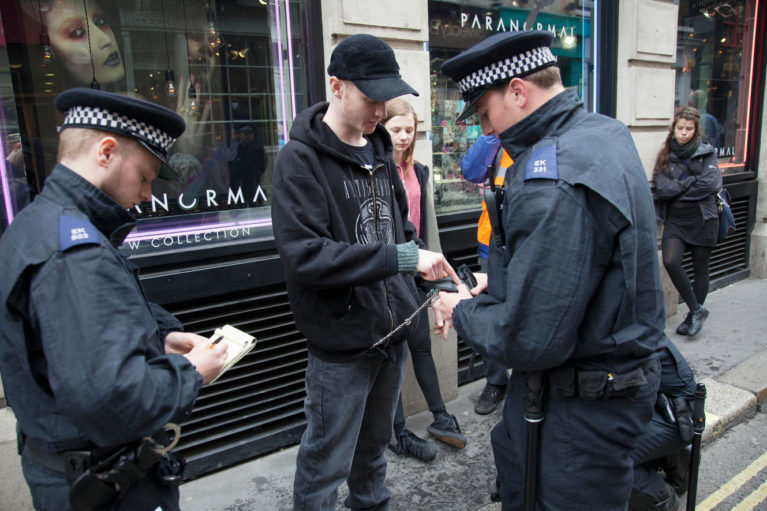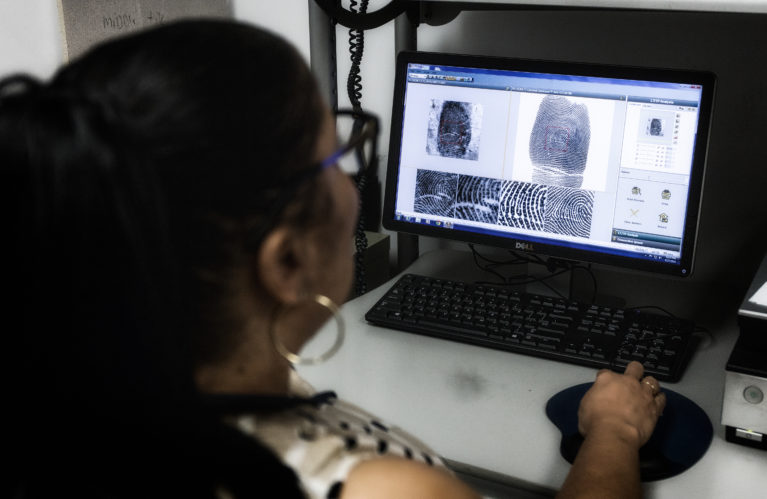Anti-racism / Hostile environment / Police surveillance technology
Mobile fingerprint scanners bring a dangerous new front to the hostile environment
Posted on 29 Nov 2019
Police officers are being used to enforce a discredited hostile environment as tens of thousands of people have their immigration status checked, creating a new barrier to vital services.
Police technology is being used to draft frontline officers into the Government’s hostile environment, undermining access to vital police services for countless people, Liberty research has found.
In England and Wales, more than half of police forces have deployed mobile fingerprint scanners – devices that carry out on-the-spot ID checks against immigration databases, turning officers into border guards.
Fingerprint scanners have been in use for years, but the ability to carry out an on-the-spot check against the Immigration and Asylum Biometric database is a new and worrying capability.
It is in everyone’s interests, and public safety more broadly, for every one of us to be able to report serious crimes to the police without fear.
Liberty obtained detailed information about police use of mobile fingerprint scanners through a series of freedom of information requests. So far more than 4,000 people have been matched against immigration databases after coming into contact with frontline police.
The police must prioritise the detection and prevention of serious crime over acting as immigration enforcement. People with uncertain immigration status, or with friends and relatives whose immigration status they are unsure of, must be able to interact with the police.
Acting in the interest of immigration enforcement runs counter to the police’s overarching duty to fight crime and keep people safe, as well as their human rights obligations to receive reports of and properly investigate serious crimes.
We found:
- At least 22 of the 43 forces across England and Wales are using or have previously used the devices, while others have plans to introduce them.
- Front-line officers have been conducting on-the-spot ID checks and running these IDs against immigration databases since February 2018.
- These scans have resulted in more than 4,350 matches against immigration databases, but forces do not record why the person had their identity checked.
- Most forces do not track the number of scans or matches made, but the Metropolitan Police confirmed that in less than 18 months they used the scanners on 21,600 people, identifying more than 1,000 who were on an immigration and asylum database.
People locked into abuse, coercion and exploitation
Frontline service providers testify that it is common for people with uncertain immigration statuses to feel unable to go to the police when they need to. Our Care Don’t Share report contains numerous testimonies showing that victims of crime get locked in abuse and ill-treatment due to fear that if they report crime they risk being reported, detained and deported.
In 2017, a woman who was five months pregnant reported to police that she had been repeatedly raped – but was subsequently arrested at a rape crisis centre on immigration grounds. In another case, a man who reported an assault to police ended up in immigration detention himself.
The Met has a policy on what to do when officers come across a victim or witness of crime who might not have settled immigration status. This policy allows police to share data on victims and witnesses.
Liberty and Southall Black Sisters have lodged a super-complaint against the policies and practices of forces sharing people’s information with the Home Office for immigration enforcement purposes.
This data-sharing is discriminatory, breaches people’s human rights and prevents victims from reporting crime.
A growing police surveillance web brings insidious new front to the hostile environment
On-the-spot biometric ID checks are an intrusive and unnecessary addition to the ever-expanding network of police surveillance technologies. When used to run checks against immigration records, they also contribute to a discriminatory system of tiered policing.
Black and minority ethnic communities are most likely to be profiled on grounds of suspected immigration status. These communities are already over-policed and many people won’t know their rights when asked by police to identify themselves in the street and are likely to comply without question.
Police have no role enforcing the Government’s toxic hostile environment. Mobile fingerprint scanners should be withdrawn, and the Government must stop co-opting vital public services into this discredited system.
Details
Confirmed they’re using or have used mobile fingerprint scanners (22):
Bedfordshire
Cambridgeshire
Cheshire
Cumbria
Derbyshire
Durham
Dyfed Powys
Essex
Gwent (announced on website after initial FOI received negative response)
Hampshire
Hertfordshire
Kent
Lancashire
Leicestershire
Lincolnshire
Merseyside
Metropolitan
Northamptonshire
Sussex
Thames Valley
West Yorkshire
Wiltshire
The Home Office revealed that there have been 4,352 matches against the Immigration and Asylum Biometrics System (IABS) by frontline officers using these scanners.
Most forces responded saying that they do not record how many scans they run or matches they make. The Met revealed that since February 2018 they had scanned 21,602 people, with 1,029 matches against the Immigration and Asylum Biometrics Database.
I'm looking for advice on this
Did you know Liberty offers free human rights legal advice?
What are my rights on this?
Find out more about your rights and how the Human Rights Act protects them
Did you find this content useful?
Help us make our content even better by letting us know whether you found this page useful or not



